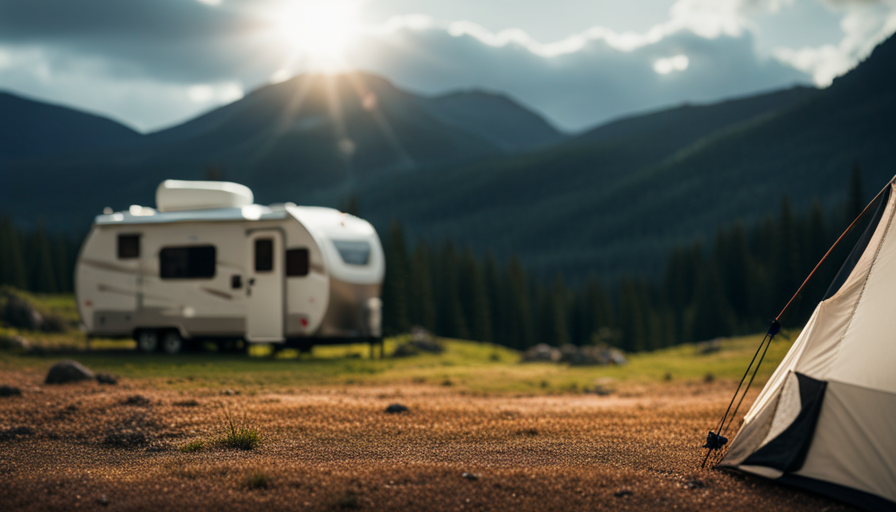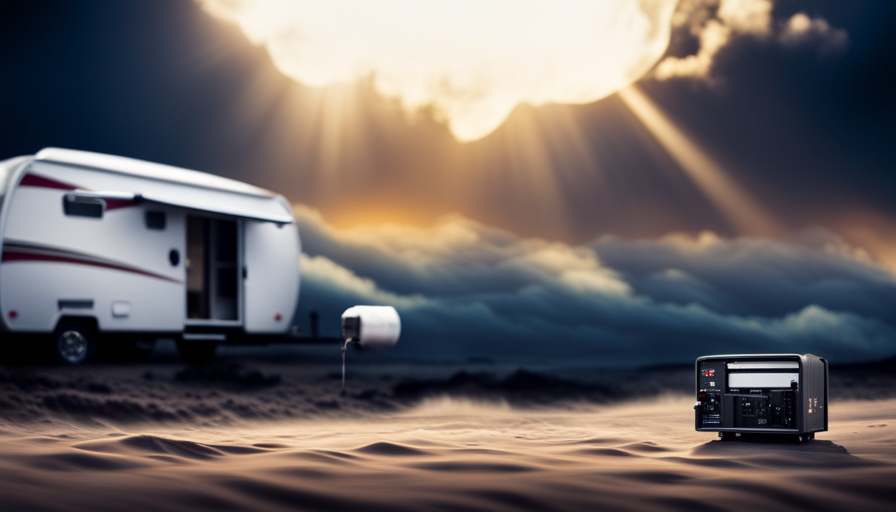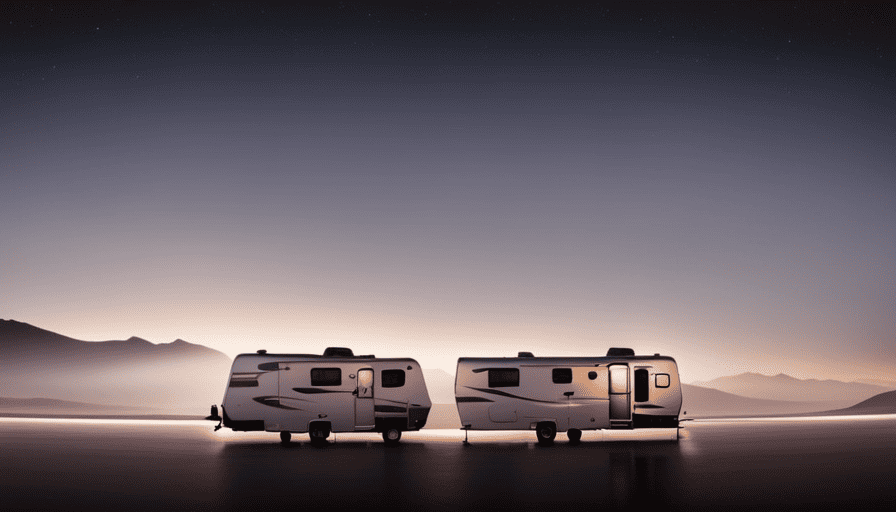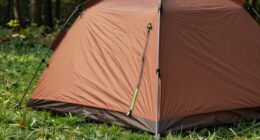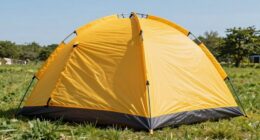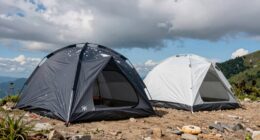Imagine this: you’re about to head out into the wilderness, getting ready for a thrilling camping experience in your RV. But before you start your journey, you need to figure out a crucial detail: what size generator is necessary to provide power for your camper?
Choosing the right generator can make all the difference in ensuring a comfortable and convenient camping experience. In this article, we will guide you through the process of determining the ideal generator size for your camper.
To begin, we will help you assess your power needs by calculating the wattage requirements of your appliances. We’ll delve into the distinction between starting watts and running watts, as well as consider the fuel efficiency of different generator types.
Furthermore, we’ll explore the differences between inverter and conventional generators, and provide you with manufacturer recommendations specific to your camper model. We’ll also touch on the potential for future power needs and the importance of seeking professional advice if you’re unsure.
So, let’s dive in and find the perfect generator to ensure a smooth and enjoyable camping experience in your camper!
Key Takeaways
- Assess power needs by calculating wattage requirements of appliances.
- Consider the distinction between starting watts and running watts.
- Calculate the wattage of appliances to determine appropriate generator size.
- Seek professional advice to determine appropriate generator size.
Determine Your Power Needs
Figuring out our power needs is crucial when deciding what size generator we’ll need to keep our camper running smoothly. To ensure that our generator can meet our power requirements, we need to calculate the power usage of our appliances and estimate the generator runtime.
First, we need to make a list of all the appliances we plan to use in the camper. This includes items like the refrigerator, air conditioner, microwave, and any other electrical devices. Then, we need to determine the power consumption of each appliance in watts. This information can usually be found on the appliance’s label or in the user manual.
Once we have the power consumption for each appliance, we can add them all together to calculate the total power usage. This will give us an idea of how much power we’ll need from our generator.
Next, we need to estimate the generator runtime. This can be done by checking the fuel consumption rate of the generator and the capacity of its fuel tank. By dividing the fuel tank capacity by the fuel consumption rate, we can determine how long the generator will run before needing to be refueled.
By calculating the wattage of our appliances and estimating the generator runtime, we can determine what size generator is best suited for our camper. Now, let’s move on to the next section and calculate the wattage of our appliances without wasting any time.
Calculate the Wattage of Your Appliances
Determining the wattage requirements for your camper appliances is crucial in ensuring you have the appropriate generator. To calculate power consumption, you need to determine the wattage requirements of each individual appliance. Start by checking the labels or manuals of your appliances, as they usually provide information about their power consumption in watts. If the wattage is not listed, you can use a simple formula to calculate it: multiply the voltage (V) by the amperage (A) of the appliance.
Once you have obtained the wattage for each appliance, add them all together to determine the total wattage requirement for your camper.
It is important to consider both the starting and running watts of your appliances. Starting watts refer to the extra power required to start an appliance, while running watts refer to the power needed to keep it running. Some appliances, such as air conditioners or refrigerators, may require significantly higher starting watts compared to their running watts. This distinction is important because you need a generator that can handle the initial surge of power when appliances start up.
By calculating the wattage requirements and considering starting vs. running watts, you can determine the appropriate generator size for your camper and ensure it can power all your appliances efficiently and safely.
Consider Starting vs. Running Watts
When powering your appliances in the camper, don’t overlook the distinction between the energy needed to start them and the energy required to keep them running smoothly. It’s important to consider both the starting watts and the running watts when determining the power requirements for your generator.
Starting watts are the extra power needed to start an appliance, usually for a few seconds or minutes, while running watts are the continuous power needed to keep the appliance running.
To determine the power requirements of your appliances, you can refer to the manufacturer’s specifications or use a wattage meter to measure the exact power consumption. Once you have the starting and running watts for each appliance, you can add them up to get the total power requirement for your camper.
Comparing generator sizes involves matching the total power requirement of your appliances with the output capacity of different generators. It’s important to choose a generator that can handle the starting watts of your appliances to prevent overload or damage. However, keep in mind that generators are less fuel-efficient when operating at their maximum capacity for extended periods.
Assessing the fuel efficiency of different generator types will help you make an informed decision about the best generator for your camper.
Assess the Fuel Efficiency of Different Generator Types
Take a look at the fuel efficiency of various generator types to help you visualize which one would be the most efficient for your camping setup.
When considering the size of generator you need to run a camper, it is important to assess the fuel consumption and environmental impact of different generator types. Fuel efficiency is a key factor to consider, as it directly affects the amount of fuel you will need to power your camper.
There are three main types of generators commonly used for camping: gasoline, diesel, and propane. Gasoline generators are widely available and generally less expensive, but they tend to have a higher fuel consumption rate compared to diesel or propane generators. Diesel generators are known for their fuel efficiency, as they can provide more power with less fuel. Propane generators are also known for their efficiency, as propane burns cleaner and more efficiently than gasoline or diesel.
Understanding the fuel efficiency of different generator types will not only help you save money on fuel costs, but it will also minimize your environmental impact. By choosing a generator with better fuel efficiency, you can reduce the amount of greenhouse gas emissions released into the atmosphere.
Now that you understand the fuel efficiency aspect, let’s move on to understanding noise levels and emissions in the subsequent section.
Understand Noise Levels and Emissions
To better understand noise levels and emissions, you’ll want to consider the impact they have on your camping experience and the environment. Noise reduction is an important factor to consider when choosing a generator for your camper. Loud generators can disrupt the peacefulness of your camping experience and disturb other campers nearby. Look for generators that are specifically designed with noise reduction features, such as sound insulation and mufflers. These features help minimize the noise produced by the generator, allowing you to enjoy a quieter camping experience.
In addition to noise levels, it’s crucial to consider the environmental impact of the generator. Some generators emit harmful pollutants, such as carbon monoxide and nitrogen oxide, which can contribute to air pollution and negatively affect the environment. Opting for generators with lower emissions is not only beneficial for the environment but also for your health and well-being. Look for generators that are certified as meeting environmental standards and have low emission levels.
Considering the impact of noise levels and emissions on your camping experience and the environment, it’s important to choose a generator that strikes a balance between performance and environmental friendliness.
Now, let’s delve into another important aspect to consider when selecting a generator for your camper: portability and storage space.
Consider Portability and Storage Space
Considering the limited space available in your camper, it’s essential to choose a portable generator that can easily be stored without sacrificing performance. When it comes to generators, portability is a significant factor to consider. A portable generator offers several benefits in terms of convenience and ease of use. These generators are designed with compact dimensions and lightweight construction, making them easy to transport and store.
Their portable nature allows you to move them around as needed, whether you’re setting up camp or traveling to a different location. In addition to portability, storage space limitations in a camper must be taken into account. With limited room available, it’s crucial to choose a generator that can fit comfortably in your designated storage area.
Portable generators are typically designed to be compact and space-efficient, ensuring they can be stored easily without taking up too much valuable space in your camper. Considering both the portability benefits and storage space limitations, it’s important to find a generator that strikes the right balance. In the next section, we will discuss how to choose between inverter and conventional generators, which will further help you determine the best generator for your camper.
Choose between Inverter and Conventional Generators
Now, let’s delve into the decision-making process of choosing between inverter and conventional generators for your camper. When it comes to powering your camper, you have two main options: inverter generators and conventional generators.
Here are some key factors to consider when making this choice:
-
Efficiency: Inverter generators are known for their fuel efficiency, thanks to their ability to adjust the engine speed based on the power demand. Conventional generators, on the other hand, run at a constant speed, regardless of the power needs, which can result in higher fuel consumption.
-
Noise level: Inverter generators are generally quieter than conventional generators, making them a popular choice for campers who value peace and quiet. Conventional generators tend to produce more noise due to their constant engine speed.
-
Size and weight: Inverter generators are typically more compact and lightweight compared to conventional generators. This makes them easier to transport and store in your camper.
-
Power quality: Inverter generators produce clean and stable power, similar to what you would get from a regular household outlet. This makes them suitable for powering sensitive electronics. Conventional generators, on the other hand, may produce power with fluctuations and voltage spikes.
Choosing between an inverter and a conventional generator for your camper comes down to factors like efficiency, noise level, size, and power quality. Keep these considerations in mind as you consult manufacturer recommendations for your camper model.
Consult Manufacturer Recommendations for Your Camper Model
When choosing between inverter and conventional generators for your camper, it’s important to consider your specific power needs. However, to ensure the optimal performance of your camper and generator, it’s always best to consult the manufacturer recommendations for your camper model.
These recommendations are based on extensive testing and analysis conducted by the manufacturer, taking into account the specific power requirements of your camper. Manufacturer recommendations provide valuable information about the size and type of generator that will best suit your camper.
They take into consideration factors such as the electrical appliances and systems in your camper, as well as the overall power consumption. By following these recommendations, you can ensure that your generator will provide sufficient power to meet your needs without overloading or damaging your camper’s electrical system.
It’s important to note that manufacturer recommendations may vary depending on the specific model and year of your camper. Therefore, it’s crucial to refer to the documentation provided by the manufacturer or contact their customer support for the most accurate and up-to-date information.
Considering the potential for future power needs, it’s essential to select a generator that has the capacity to handle any additional electrical appliances or systems you may add to your camper in the future. This will ensure that you can continue to enjoy a reliable source of power while on the road, without the need for constant upgrades or modifications.
Consider the Potential for Future Power Needs
To ensure you have enough power for any additional electrical appliances or systems you may add in the future, it’s important to think ahead and select a generator with sufficient capacity. This will allow for potential improvements and long-term sustainability in your camper’s power supply.
When considering the potential for future power needs, keep in mind the following:
-
Determine the maximum power requirements of your current electrical appliances and systems. This will serve as a baseline for calculating the generator capacity needed.
-
Consider any potential improvements or upgrades you may make to your camper in the future. These additions may require additional power, so it’s essential to choose a generator that can accommodate these changes.
-
Think about the long-term sustainability of your power supply. Opting for a generator with extra capacity can provide flexibility and ensure that your camper remains powered even as your needs evolve.
-
Take into account any specific power requirements for appliances or systems that you plan to add in the future. This will help you determine the minimum generator capacity needed to support these additions.
To ensure you select the right generator size for your camper, it’s always a good idea to seek professional advice if unsure.
Seek Professional Advice if Unsure
If you’re uncertain about the appropriate steps to take, seeking professional advice can provide valuable insight and ensure a successful power setup for your camper. When it comes to determining the size generator you need to run a camper, seeking a professional opinion is highly recommended.
Professionals in the field have the knowledge and expertise to assess your specific needs and guide you towards the right generator. A professional can take into account various factors that influence your power requirements. They will consider the size and type of your camper, the appliances and equipment you plan to run, and any potential future power needs. By analyzing these factors, they can provide you with a detailed assessment and recommend the appropriate generator size.
Seeking advice from professionals also ensures that you avoid any potential mistakes or safety hazards. They are familiar with the latest technology and regulations and can help you navigate through the vast array of generator options available in the market. Additionally, they can provide you with tips and recommendations on proper maintenance and usage, maximizing the lifespan of your generator.
When it comes to determining the right generator size for your camper, seeking professional advice is crucial. Their expertise and knowledge will help you make an informed decision, ensuring a reliable and efficient power setup for your camping adventures.
Frequently Asked Questions
Can I run multiple appliances simultaneously with a generator?
Yes, you can run multiple appliances simultaneously with a generator. However, it’s crucial to take certain safety precautions when using a generator for camping.
Firstly, ensure that the generator is placed outside in a well-ventilated area to prevent carbon monoxide poisoning. Additionally, make sure to use proper extension cords and avoid overloading the generator by not exceeding its maximum power capacity.
Following these safety measures will help ensure a smooth and safe camping experience.
How long can a generator run continuously without overheating?
To maintain a generator for long-term use, it’s important to understand how to prevent overheating. Common causes of generator overheating include insufficient airflow, excessive load, and dirty air filters.
To avoid overheating, ensure proper ventilation by placing the generator in a well-ventilated area. Regularly clean or replace air filters to prevent dust and debris from clogging the system.
Additionally, avoid overloading the generator by not exceeding its maximum capacity. Regular maintenance and monitoring of these factors will help prevent overheating and ensure continuous operation.
Can I use a generator in wet or rainy conditions?
Yes, you can use a generator in wet or rainy conditions, including marine environments. However, it’s important to take certain precautions and perform regular maintenance.
To ensure safe operation, generators used in these conditions should be equipped with weatherproofing features and have proper grounding. Regular maintenance, such as checking for water damage, inspecting seals, and keeping the generator covered when not in use, is also crucial.
Adhering to these guidelines will help prevent any potential issues and ensure the longevity of your generator.
Can I connect my generator directly to my camper’s electrical system?
Yes, you can connect your generator directly to your camper’s electrical system. This allows you to power your camper using the generator’s energy. When connecting the generator, make sure to follow the necessary safety precautions and consult your camper’s manual for specific instructions.
Additionally, if your camper has solar panels, you can connect the generator to them to recharge the batteries. Remember to regularly maintain your generator by checking oil levels, cleaning air filters, and inspecting spark plugs.
Are there any special considerations for using a generator at high altitudes?
When using a generator at high altitudes, there are some special considerations to keep in mind. High altitude generator performance can be affected due to the thin air and reduced oxygen levels. This can lead to decreased power output and potential engine issues.
To mitigate these effects, regular generator maintenance at high altitudes is crucial. This includes checking the air filters, fuel system, and spark plugs for any signs of damage or wear. Additionally, adjusting the carburetor may be necessary to optimize performance.
What Factors Should I Consider When Determining the Size of Generator I Need for a Camper?
When deciding on the generator size for running a camper, several factors need consideration. First, determine the power requirements of your camper appliances and devices. Assess if you need a generator for occasional use or continuous power supply. Additionally, consider the physical space available and noise levels that suit your camping needs.
Conclusion
In conclusion, determining the right size generator for your camper requires careful consideration of your power needs, appliance wattage, fuel efficiency, noise levels, and future power requirements.
It is crucial to consult the manufacturer recommendations for your specific camper model to ensure compatibility. Seeking professional advice can also provide valuable insights.
Remember, just like finding the perfect camping spot, finding the right generator is an essential piece of the puzzle for a successful and enjoyable camping experience. So, don’t forget to power up and embark on your outdoor adventures with confidence!

